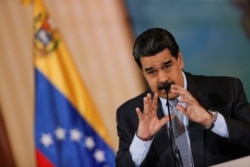Venezuela was elected Thursday to the U.N. Human Rights Council, despite criticism of the South American country's human rights record.
The HRC works to promote and protect human rights around the world, and the membership of the council is voted on by the U.N. General Assembly. Each region has a set number of seats elected in staggered three-year terms.
Venezuela won its seat with 105 votes.
Brazil took the other Latin American seat that was up for election with 153 votes.
Costa Rica announced its candidacy Oct. 3 to try to prevent Venezuela's nomination and garnered only 96 votes. The Latin American country said Venezuela was "not an adequate candidate" because of serious human rights violations.
'Historic day'
"Today is a historic day for our country. International law has triumphed and the attempt to impose a colonial enclave in Venezuela has failed," announced U.N. Ambassador Samuel Moncada on Twitter. "The U.N. has shown that it belongs to all humanity and not a small group that wants to use it to impose its supremacy."
Human Rights Watch made a statement with 54 other groups on Oct. 10 opposing the South American nation's candidacy because of the government's history of extrajudicial killings and arrests of dissidents.
A U.N. human rights report, issued by the HRC in July 2018, criticized the government's policies "aimed at neutralizing, repressing and criminalizing political opponents and people critical of the government."
The report suggested that over 7,000 people had been killed in extrajudicial killings by the government.
Venezuelan President Nicolas Maduro slammed the U.N. report last year in a letter to U.N. High Commissioner for Human Rights Michelle Bachelet as being biased and inaccurate.
Recognition of Guaido
More than 50 countries have declared the Maduro government illegitimate. Instead, the countries, including the United States, recognize National Assembly leader Juan Guaido as the country's legitimate acting president.
The United States left the HRC in 2018 for its criticism of Israel and the presence of countries with poor human rights records on the council.
"It is a massive source of embarrassment for the United Nations that some governments with egregious human rights records sit on the U.N. Human Rights Council," said President Donald Trump at the time.
Although the president did not name specific countries, U.S. allies Saudi Arabia and Qatar sat on the Human Rights Council at the time and have been criticized for their human rights records.
Venezuela and Brazil will join the other 12 new members elected to the 47-member body and will be in charge of helping bring attention to human rights abuses around the world.





